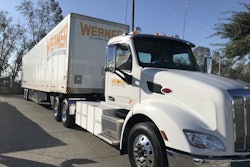 Bill Combs, Penske’s director of connected fleet, spoke to attendees of this week’s Geotab Connect 2020 conference in San Diego.
Bill Combs, Penske’s director of connected fleet, spoke to attendees of this week’s Geotab Connect 2020 conference in San Diego.In March 2018, Daimler Trucks North America (DTNA) approached Penske Transportation Solutions with an opportunity to test new electric vehicle (EV) prototypes. DTNA asked Penske to test 10 straight trucks and 10 day cabs.
Penske provided DTNA input and feedback as the prototypes were finalized for the turning radius, vehicle weights and other specifications. Penske then began testing two EVs last December in southern California.
“This is new to all of us,” said Bill Combs, director of connected fleet for Penske, at the Geotab Connect 2020 conference in San Diego.
The company installed a charging infrastructure and has been operating two eCascadia class 8 tractors to make between eight and 12 deliveries nightly in routes of 130 to 250 miles. The prototypes now have surpassed 10,000 miles in real-world operations, he said.
While testing the EVs, Penske uses a telematics system from Geotab. The EVs have Geotab’s Go device connected to their data ports to transmit telematics data to the cloud-based fleet management system.
Combs said that with the Geotab technology, “2020 will be the year of insights from the deployments we are starting to make with these [electric] vehicles.”
Penske remotely monitors and analyzes the operating data of the EVs, such as their state of charge and battery health. Penske also has Geotab’s Go telematics devices on a portion of its fleet of gas and diesel rental and lease vehicles.
Geotab acquired expertise in EV telematics in June 2018 by purchasing FleetCarma. The acquisition put Geotab in a unique position to help fleets accelerate the uptake of EVs, said Matt Stevens, the company’s vice president of electric vehicles.
At the Geotab conference, a representative from the State of California explained why using telematics data from EVs is critical for the state government to meet its goal. Within five years, the state wants 50% of its light-duty vehicle purchases for government fleets to be zero-emissions vehicles.
“If we don’t have a tool that identifies opportunities to replace internal combustion engines with zero-emissions vehicles, it won’t happen,” said Evan Speer, chief of the office of fleet and asset management for the California Department of General Services.
At present, Geotab has Go telematics devices installed in about 15,000 electric vehicles globally, which is less than 1% of Geotab’s two million total vehicle subscriptions for light-, medium- and heavy-duty vehicles. But having 15,000 connected EVs makes Geotab the largest telematics provider in this rapidly growing market segment, Stevens said.
 With more than 15,000 connected EVs, Geotab is the largest telematics provider in this rapidly growing market segment, said Matt Stevens, vice president of electric vehicles for Geotab.
With more than 15,000 connected EVs, Geotab is the largest telematics provider in this rapidly growing market segment, said Matt Stevens, vice president of electric vehicles for Geotab.At the Connect 2020 conference, Geotab announced a new tool for fleets to have the data they will need to determine which gas- and diesel-powered vehicles they can convert to electric. Among the questions the tool will answer for fleets within a matter of minutes: How much will EVs cost? Will they leave drivers stranded? Will they save the fleet money? What will be the environmental impact of reducing tailpipe emissions?
Free EV assessments
With Geotab’s new Electric Vehicle Suitability Assessment (EVSA) tool, fleets will be able to run an unlimited number of assessments that use telematics data from Geotab’s Go devices installed on their fuel-powered vehicles.
The tool compares vehicle operating data to the universe of telematics data collected by Geotab from EVs with similar operating profiles. The assessment predicts the energy use, efficiency and range of EVs. If a fleet has vehicles that operate in temperatures of minus 15 degrees, the assessment will determine how EVs in their fleet would perform under the same conditions.
The application gives an electrification recommendation for specific models of fully electric or hybrid light-duty vehicles that would be suitable for any fleet. EVSA is offered free to Geotab customers as an add-in on the Geotab Marketplace, which is a portfolio of mobile apps, software add-ins and hardware add-ons.
To use the tool, fleets have to use Geotab devices on their vehicles and have a minimum of three weeks and a maximum of three months of telematics data.
As for why Geotab would offer the service for free, Stevens said, “we want to make sure that fleets who are going electric know that Geotab is the right [telematics] solution for them.”
At present, the assessment only considers operating profiles where EVs are being charged overnight, Stevens said. The assessment currently does not consider opportunities for drivers to recharge vehicles in their routes during work breaks.
The EVSA tool is designed to assess EV replacement for passenger cars, SUVs and light-duty vans at the moment, but Stevens said Geotab has been getting a lot of requests to make the tool available to assess medium- and heavy-duty vehicles, which is more complicated because of the impact of payloads on vehicle ranges.
While use of Geotab’s EVSA tool currently is limited to light-duty vehicles, Stevens said the company will work with specific customers and resellers to help with EV assessments that factor unique payload requirements.











